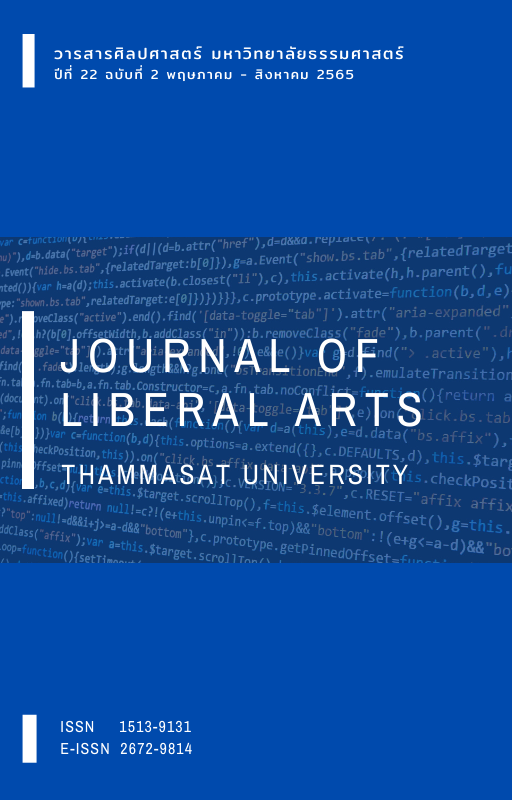การมีส่วนร่วมในการส่งเสริมวัฒนธรรมท้องถิ่นในจังหวัดชายแดนใต้อย่างยั่งยืน: กรณีศึกษาการแสดงมะโย่ง อำเภอเมือง จังหวัดปัตตานี
Main Article Content
บทคัดย่อ
การมีส่วนร่วมในการส่งเสริมวัฒนธรรมท้องถิ่นในจังหวัดชายแดนใต้อย่างยั่งยืน ใช้วิธีวิจัยเชิงคุณภาพ โดยการสัมภาษณ์แบบเจาะลึกผู้ให้ข้อมูลหลัก 30 คน ได้แก่ นักแสดงมะโย่ง ประชาชน ภาครัฐ และเอกชน ใช้วิธีการเลือกแบบเจาะจง วิเคราะห์ข้อมูลในเชิงคุณภาพตามวัตถุประสงค์และนำเสนอข้อมูลในเชิงการพรรณนา ผลการวิจัยพบว่า พัฒนาการของการแสดงมะโย่งที่มีความเกี่ยวข้องกับการดำรงชีวิตในด้านวัฒนธรรมท้องถิ่นของจังหวัดปัตตานี มีมานานมากกว่า 400 ปี ซึ่งปรากฏหลักฐานเด่นชัดในสมัยราชินีชื่อฮิเยา ครองเมืองปัตตานี และยังพบการบันทึกในสมัยพระบาทสมเด็จพระจุลจอมเกล้าเจ้าอยู่หัว เสด็จประพาสแหลมมลายู ต่อมาได้แพร่หลายสู่ประชาชนทั่วไป และเป็นการใช้เพื่อความบันเทิงและประกอบพิธีกรรมในการรักษาโรคภัยไข้เจ็บ ในขณะเดียวกันยังพบว่าเงื่อนไขของการส่งเสริมวัฒนธรรมท้องถิ่นให้สามารถคงอยู่อันได้แก่ การมีส่วนร่วมในการค้นหาปัญหา และสาเหตุของปัญหา การมีส่วนร่วมในการวางแผนพัฒนา การมีส่วนร่วมในการดำเนินงานพัฒนา การมีส่วนร่วมในการรับผลประโยชน์ และการมีส่วนร่วมในการประเมินผล ซึ่งสามารถสร้าง และยกระดับเป็นองค์ความรู้ของท้องถิ่นเพื่อดำรงรักษาไว้ซึ่งศิลปวัฒนธรรมเพื่อความยั่งยืน
Downloads
Article Details

อนุญาตภายใต้เงื่อนไข Creative Commons Attribution-NonCommercial-NoDerivatives 4.0 International License.
เอกสารอ้างอิง
Boonchanpetch, P. (2001). A study of folk drama of Muslim Thai in southern border provinces. [Master’s thesis]. Thaksin University. http://hdl.handle.net/123456789/3366 (in Thai)
Bunchu, S. (1984). Community development: Community Study and project planning. Thammasat University Press. (in Thai)
Chongwutwet, N. (1984). The participation of the people in the development. Mahidol University Press. (in Thai)
Culture of Pattani Province. (2008). Cultural network and community participation in cultural management: a case study of Mayong performance in Muang district, Pattani province. Culture of Pattani province. (in Thai)
Educational Standards Office, Office of Rajabhat Institutes Council, Ministry of Education, Educational Standards Office and Ministry of University Affairs. (2002). Self–Learning package:Community research study. S.R.Printing. (in Thai)
Kaewha, W. (2000). The process of strengthening the community, civil society community (4th ed.) Primary Health Development and Training Center in the Northeast in Conjunction with Network of the local health community. https://web.codi.or.th (in Thai)
Kaewthep, K. (1995). Development of community culture. Catholic Council of Thailand for development. (in Thai)
Kanchanaphan, A. (1996). Thai society according to the thoughts and dreams of Ajarn Chatthip Naksupa. The Thailand Research Fund. http://www.shi.or.th (in Thai)
King Prajadhipok's Institute (2002). Study for the development of system development Index good management. King Prajadhipok's Institute. (in Thai)
Kuisakhon, P. (2004). The development of drill exercise on multiplication and division by interrating local wisdom for fifth grade students [Master’s thesis]. Silpakorn University. http://www.sure.su.ac.th/xmlui/handle/123456789/7384/fulltext.pdf (in Thai)
Limkarnchanapong, A. (2000). Makyong performance of Seri Patani Troupe. [Master’s Thesis]. Chulalongkorn University. Chulalongkorn University Intellectual Repository (CUIR). http://cuir.car.chula.ac.th/handle/123456789/6033. (in Thai)
Mingmaneenakin, W. (1988). Thai rural development. Thammasat University Press. (in Thai)
Naksupa, C. (2002).Thai culture and process of Thai social change. Chulalongkorn University Press. (in Thai)
Nilpani, C., & Thanaphongsathorn K. (1989). Participation of citizens in rural development. Sukhothai Thammathirat University press. (in Thai)
Office of the National Village and Urban Community Fund, the Office of the Rajabhat Institute Council and the University Bureau. (2003). Graduate fund thesis synthesis report graduate diploma program branches of project management and assessment office of the national village and Urban community fund. Office of the Rajabhat Institute Council. (in Thai)
Pattanapongsa, N. (2004). Participation: Fundamental principles, Techniques and case studies. Sirilak Publication. (in Thai)
Petchkaew, C. (1991). Habits and Personalities of Southern People That Affect the Development. Institute for Southern Thai Studies. (in Thai)
Prince of Songkhla University, Pattani Campus. (1976). Mayong: culture of Muslim folk plays. Prince of Songkhla University. (in Thai)
Puangngam, K. (2002). Community strengthening. n.p. (in Thai)
Ruengnarong, P. (1976). Mayong: muslim folk play culture. http://download.clib.psu.ac.thayong1.html.
Roopngam, Y. (2002). The participation of government officials, Bureau of the Budget in bureaucratic reform [Master’s Thesis]. National Institute of Development Administration (in Thai)
Sampetch, S. (2004). The development of training curriculum on instructional plan relevant to local wisdom occupation for primary school teachers Samut Songkhram province [Master’s thesis]. Silpakorn University.
http://202.28.75.7/xmlui/bitstream/handle/123456789/6811/fulltext.pdf (in Thai)
Santasombat, Y. (1996). Tha Kwian: Introductory articles on adaptation of Thai farmers community amid the siege of industrial culture. Kobfai Publishing House. (in Thai)
Setso, R. (1985). Rural sociology. Thai Wattana Panit. (in Thai)
Sriaraya, Y. (2005). East folk wisdom in globalization struggle. Institution of Witheetat. (in Thai)
Srisantisuk, S. (1991). Community sociology: Principles of education analyze and practice the community [Master’s thesis]. KhonKaen University. (in Thai)
The Thai Cultural Encyclopedia Foundation of The Siam Commercial Bank. (1999). The Southern Thai Cultural Encyclopedia, Volume 12, Phagavata – Mueang Phra Wiang. The Thai Cultural Encyclopedia Foundation of The Siam Commercial Bank. (in Thai)
Traditions and culture of the villagers in the foothills: Mayong or Mar Yong. (2016). http://www.geocities.com. (in Thai)
Walaisathien, P., Phamahasuthit, O., Wiset, S., Benchasap, C., & Hasanari, C. (2000). Process of development and techniques. The Thailand Research Fund. (in Thai)
Wallipodom, S. (1995). The Analyst for Changing Thai social direction. Ming Muang Press. (in Thai)
Wanphet, A. (2019). Nora Kaek of Pong Pee Nong Troupe in Narathiwat Province. Journal of Fine and Applied Arts, Khon Kaen University, 11(1), 1-27. (in Thai)
Wasi, P. (1998). National strategy for economic strength society and culture, Special lecture of Puay Ungphakorn. Economics at Thammasat University (in Thai)


